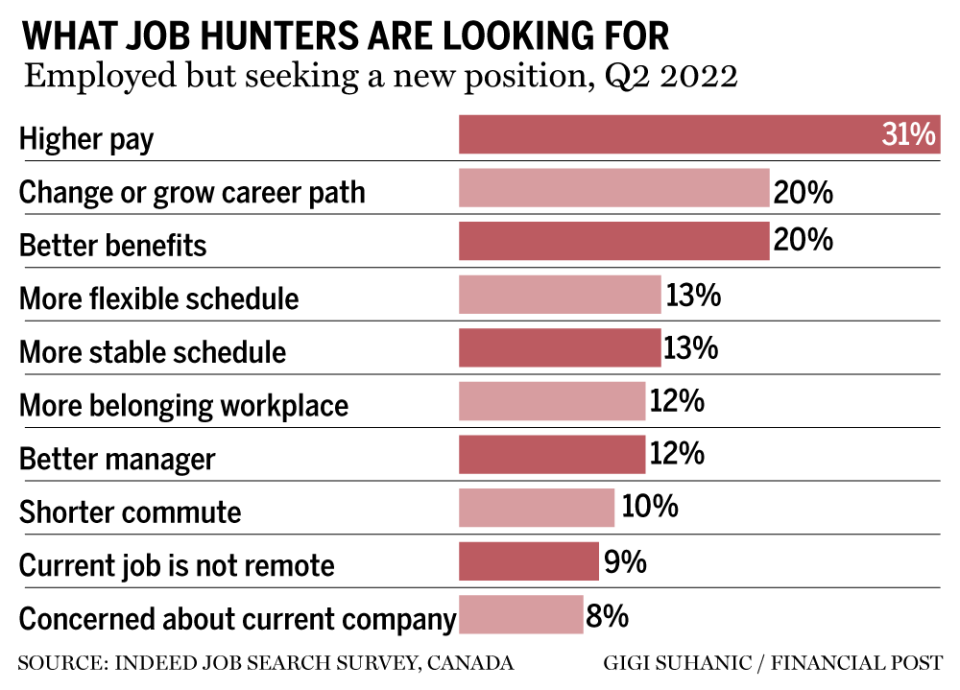The age of the toxic boss is over: Workers aren't willing to suffer for a paycheque anymore

If Elon Musk‘s disastrous takeover of Twitter Inc. has proven anything, it’s that the time of the heavy-handed boss is well and truly behind us. Workers just aren’t willing to suffer for a paycheque, and they’ll quit to prove it, as Musk found out last week.
Hundreds of Twitter’s employees headed for the exits after Musk issued an ultimatum: get ready to work “long hours at high intensity” or leave with a three-month severance package. People overwhelmingly decided to quit. Before the 5 p.m. Thursday deadline, internal Slack channels were flooded with staffers posting emojis of blue hearts and salutes as they said goodbye. Sensing the impending wave, Musk tried to convince some workers he considered essential to stay on, according to a report in the New York Times. He failed. The employees he had been lobbying in a video meeting all logged off at 5 p.m. while he was still making his case.
The exodus was so great that on Friday, #RIPTwitter started trending as users became certain the platform would crumble with few engineers left to patch the cracks. Twitter’s workforce has been cut to the bone since Musk got the keys at the end of October. He immediately laid off 3,700 workers, or roughly half its workforce, and then fired many more, reportedly getting rid of anyone who dared criticize him.
The mass resignations should have been a wakeup call for Musk, who has often bet on wielding power over his employees by threatening to fire them if they don’t toe the line. At Tesla Inc., he put an end to remote work, ordered staff back to the office and fired those who refused. He issued a similar directive at Twitter, only to later walk it back in an effort to staunch the bleeding of workers.
That could be a sign Musk is beginning to learn what most other bosses have discovered during a time of labour shortages and sky-high job vacancies: don’t underestimate the power of the worker. That power is likely to stay where it is for longer than some expect, because hiring challenges will persist for years, says a workplace trends report from Indeed, a job postings site, and Glassdoor, with an aging population the main driver of shortages in Canada.
Victoria Wells: Why salary transparency laws may shrink your paycheque
Quiet quitting is picking up speed as workers tune out from their jobs
Workers are stressing out over their finances — and it’s costing employers billions
Hybrid work is the future, but expect to be in the office more often than not
“What is critical for leaders to understand is that these changes and shifts are not temporary. There will be no return to ‘normal’ that many seem to be awaiting,” Svenja Gudell, Indeed’s chief economist, says in a news release.
That means bosses will have to give workers what they want if they hope to avoid more hiring problems. And what they want shouldn’t come as a surprise to anyone who’s been paying attention these past few years: flexibility, higher pay, better benefits, the ability to work from home, workplace well-being policies and diversity strategies.
Employers in Canada seem to be paying attention. Job listings for remote work are on the rise, making up 11.2 per cent of all postings in September on Indeed. That’s four times the pre-pandemic rate, and a sign of things to come. “Remote work is here to stay,” Brendon Bernard, senior economist at Indeed Canada, says in a blog posting.
Meanwhile, employees are finished with toxic work environments. Almost half of employees in Canada, the United States and the United Kingdom expect a level of happiness at work, says Indeed’s latest workplace well-being study. Those who are content with their work environment are also much less likely to leave their current employer for greener pastures — just ask any recent ex-Twitter employee.
At this point, no worker with any pride is going to subject themselves to a boss who demands intense overtime, little work-life balance and unnecessary full-time office mandates, especially if their skills are in high demand. There’s a better way, and employees have seen it in action. In many cases, they’ve lived it.
Layoffs have hit some companies, but there are still close to a record million job vacancies in Canada. There’s always another job out there offering better benefits, flexibility or the opportunity to work from home a few days a week. Bosses better figure that out or else they could find themselves holding the reins to the shell of a company, not unlike a certain seemingly oblivious billionaire.
• Email: vwells@postmedia.com | Twitter: vwells80
This column was first published in the FP Work newsletter, a curated look at the changing world of work. Sign up to receive it in your inbox every Tuesday.

 Yahoo Finance
Yahoo Finance 
